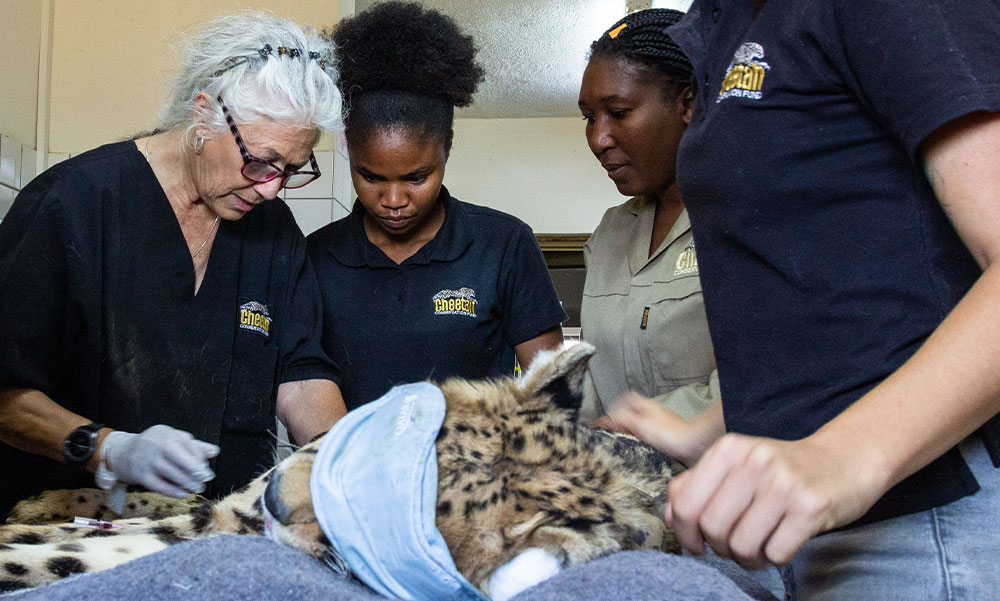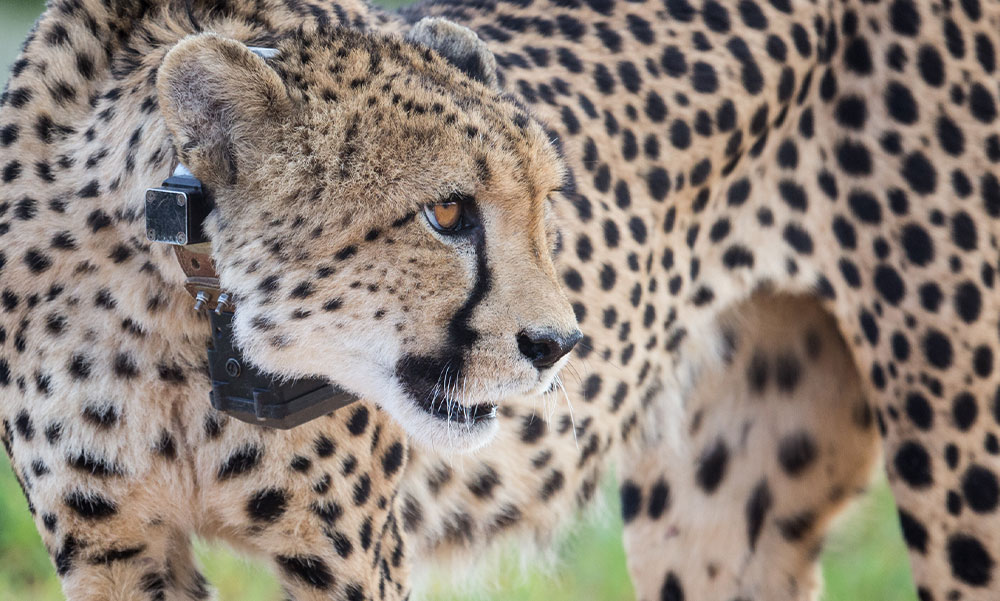Cheetah Conservation Fund and Namibian government to send eight cheetahs to India for introduction on 17 September
-

- by CCF Staff September 14, 2022

OTJIWARONGO, Namibia (14 September 2022) – Cheetah Conservation Fund (CCF) staff will travel to India later this week to deliver a very special gift from the Namibian government: eight wild cheetahs. This group of iconic, spotted big cats is making history as the first to be translocated from southern Africa to Asia to create a new meta population, in a place where cheetahs once roamed freely, but were extirpated more than 70 years ago. Namibia, the country that has traditionally had the greatest density of wild cheetah, is donating the first eight individuals as part of a larger, multi-year agreement to help conserve the species through India’s Project Cheetah.
Three Namibian male and five female adult cheetahs (all between two to five-and-a-half-years-old) will make the 11-hour, transcontinental journey to India’s Kuno National Park on 16 and 17 September. Each has been vaccinated, fitted with a satellite collar, and kept in isolation at the CCF Centre in Otjiwarongo. The cheetahs were selected based on an assessment of health, wild disposition, hunting skills, and ability to contribute genetics that will result in a strong founder population.
The mission to move the cheetahs will begin the afternoon of Friday, 16 September with the transfer of cats from the CCF Centre to the Hosea Kutako International Airport in Windhoek, Namibia’s capital. After a brief ceremony to acknowledge Namibia’s donation and the significance of the mission, the cheetahs will be loaded onto a private B747 jet. The plane will fly overnight and land in Jaipur, India, by daybreak. The cheetahs will be transferred from Jaipur to Kuno National Park in the state of Madhya Pradesh by helicopter. There, they will be welcomed into their new home by India’s Prime Minister Narendra Modi, who will open the gates to the Kuno sanctuary created for the cheetahs on Saturday, 17 September, a date that also marks his 72nd birthday.
“Conservation of species requires global cooperation. For more than 12 years, I have consulted with the government of India and their scientists on how to bring cheetahs back to the landscape, and now, it is happening! As a conservationist, I am thrilled, and as CCF’s leader, I am exceptionally proud of the work of our CCF reintroduction team. Without research and dedication to cheetah conservation, this project could not take place”, said Dr Laurie Marker, Founder and Executive Director of CCF. “We are also very fortunate to have supportive colleagues within Namibia’s Erinidi Private Game Reserve and the Ministry of Environment, Forestry and Tourism”.
A popular species around the world, many people are surprised to learn cheetahs are in peril. One of the oldest of the big cat species, with ancestors tracing back about 8.5 million years, cheetahs were once widely dispersed throughout Asia and Africa in great numbers. Today, they occupy less than nine percent of their historic range, with fewer than 7500 individuals remaining in the wild. Cheetahs are threatened by human-wildlife conflict, illegal wildlife trade, poor sperm quality and lack of genetic diversity, but one of their greatest challenges to survival is the loss of habitat together with loss of prey base. The shrinking of their natural habitat is due to a combination of increasing human populations and climate change impact.
“We are delighted to be working closely with the Government of Namibia to bring cheetahs back to India, and we thank them for their support. Conservation is part of India’s civilizational ethos. Launch of the Cheetah reintroduction plan by Prime Minister of India is a firm expression of the commitment India has to protect its natural heritage, along with the people who are part of these eco-systems. We welcome these first individuals as goodwill ambassadors for conservation and our partnership. This initiative is all the more special as it is being implemented at a time when India is celebrating its 75th Independence anniversary”, said Prashant Agrawal, High Commissioner of India to Namibia.
“The goal of our project is to reverse the tide for cheetahs, to slow, then stop their decline, while at the same time increasing the biodiversity and health of Indian ecosystems. Bringing back a top predator restores historic evolutionary balance, resulting in cascading effects, leading to better management and restoration of wildlife habitat, for the benefit of all species, and will uplift the livelihoods of poor forest dwelling communities”, said Dr Jhala Yadvendradev, Dean of the Wildlife Institute of India and Principal Scientist for Project Cheetah.
The Honourable Peter Katjavivi, Speaker for the National Assembly of Namibia and CCF’s International Patron, adds, “The Cheetah Project with India is something that every Namibian can take pride in. We are helping create a conservation model that can be used by other African nations and former range states around the world to save a species. As a nation, we are helping conserve the feline icon of speed and grace, for the benefit of our planet, earning our title, Cheetah Capital of the World”.


# # # # #
About Cheetah Conservation Fund
Cheetah Conservation Fund (CCF) is the global leader in research and conservation of cheetahs and dedicated to saving the cheetah in the wild. Founded in 1990, CCF is an international non-profit organisation headquartered in Otjiwarongo, Namibia, the “Cheetah Capital of the World”, with a field base in Hargeisa, Somaliland. CCF takes a holistic approach to conservation, recognising that to help the species, we first must help the people who live alongside wildlife. CCF’s strategies are built on three pillars: research, education and conservation. CCF marked its 30th anniversary in 2020, making it the longest running and most successful conservation organisation for cheetahs. For more information, please visit www.cheetah.org.
Media Contact
Susan Yannetti, Cheetah Conservation Fund (CCF)
Related Reading

